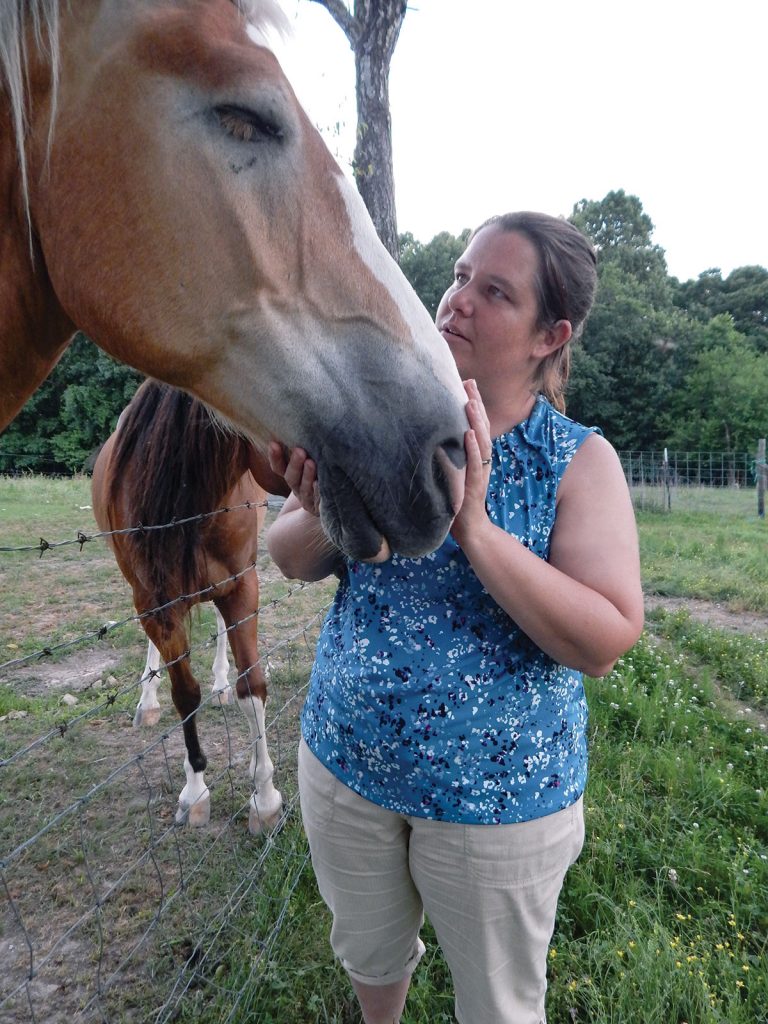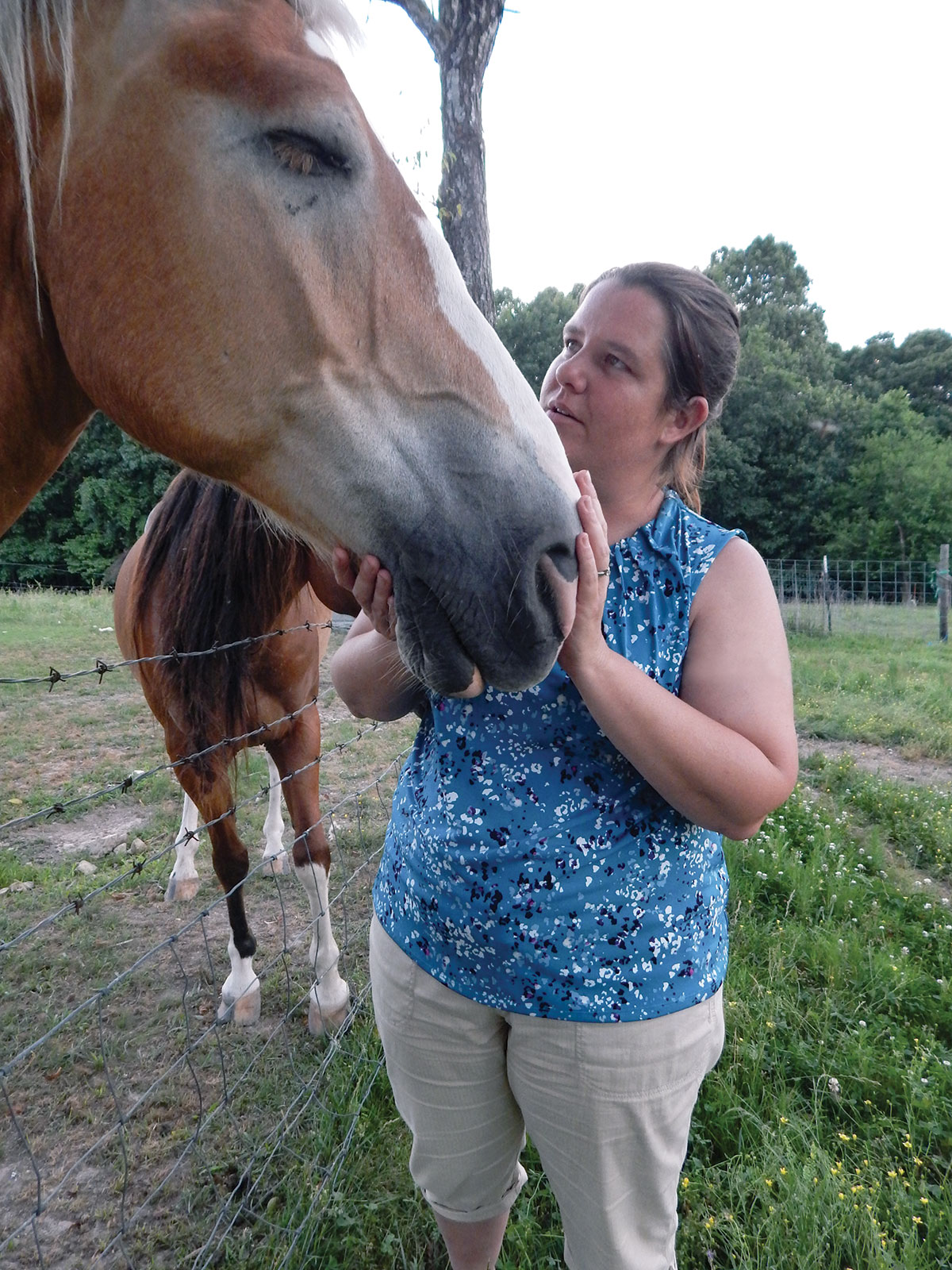
Jennifer Lutes found her “home” in agriculture
Jennifer Lutes never intended to have a career in agriculture but the Beaufort, S.C., native now says she cannot see herself doing anything else.
Living in rural McDonald County, Mo., with her husband Joseph, a family nurse practitioner in Newton County, and their two youngest children, Autumn and Nathan, she loves the sense of community and the fact there are four seasons here, instead of the two in the deep south.
Jennifer was raised in a military family. Her father was a Marine, her mother was Navy and her husband also was a Marine. Their oldest son Kyle now serves in the Marines.
Although, she never thought about farming or livestock growing up, her mother reminded her as a child she always wanted to buy a farm and raise horses.
Her unintentional journey into agriculture began soon after they arrived in Missouri in 2004.
Even though early jobs were in the restaurant field, working up from food prep to manager, she wanted a change and began computer science classes at Missouri Southern State University. They had moved to a 38-acre spot with shade trees and sloping meadows that flattened out into a pasture and coupled with a pond, it was a perfect place to raise livestock. Their first attempt began with a herd of small goats. However, they soon noticed the animals were getting sick and within a matter of hours they started to die.
Unsure of the cause, they sold the few remaining goats.
Jennifer, not one to be bested by a challenge, decided to check into classes that might educate her on caring for small ruminants at Crowder College in Neosho.
“When I took my first ag class, I finally felt a sense of home,” Jennifer said. “I had taken many classes at that point and done well in them, I hadn’t felt a sense of belonging.”
She dove into animal production classes and began working on the student farm, giving her a chance to develop skills in all aspects of farm operations.
She completed both an associate’s of science in general agriculture and an associate’s of arts in agricultural business.
“The ag classes, teachers and students finally felt right,” Jennifer said. “I have always loved every type of animal but when I began working with different types of animals, the pieces finally began to fit together.”
At home, they began raising horses, predominantly Belgians and Percherons, with as many as 16 at the zenith of their production until the market declined.
Always a horse lover, Jennifer still has three “pasture ornaments” whom she dotes on.
Her studious passion to make connections between ideas and topics, gaining knowledge in what was once an unfamiliar field of study became something she could immerse herself.
After Crowder, she learned about the University of Arkansas’ poultry science program while on a field trip. She met with a recruiter and found she qualified for enough scholarships to cover the two years she would need to complete her bachelor’s.
Although, it would mean that she would have to re-home the menagerie of fowl residing on their hobby farm.
Her journey into agricultural studies earned her a bachelor’s in Food and Life Science, majoring in poultry with a minor in agribusiness. But she did not stop there.
“I believe that you should take opportunities when they present themselves,” Jennifer said.
Again, her college performance and eagerness to learn, earned her the opportunity to work on her master’s in ag economics as a researcher. She discovered a knack for research and working with numbers.
Meanwhile, with fewer horses and the pasture sitting idle, the Lutes decided to try goats again. First, they raised meat goats, then transitioned to Kiko’s for their maternal traits. At their peak, they owned 50 breeding does and two bucks.
But when the goats effectively cleaned up all the brush, they decided to reduce the goat herd and purchase Katahdin sheep.
Hoping to better understand herd management, she dove into researching the goat market and found that live goat prices fluctuated throughout the year. She also realized there was a sharp contrast between sheep and goat market prices.
Wanting to earn more per head on her goats, she developed a research model for one of her classes that revealed profit differences between selling different size goats in different months.
“The goat market is not broadly studied and is relatively young compared to cattle, hog, sheep and poultry markets,” Jennifer said. “In 2010, the U.S., became a net importer of goat meat and today meat goats are a very strong market because of the increased demand.”
Missouri has many livestock auctions that sell small ruminants, but there are only six designated livestock auctions in the state that USDA Market and Analysis reporters use for price discovery.
Despite this, there are few researchers looking into the market and data is difficult to compile without adequate conversion software.
Today, Jennifer works for the University of Missouri Extension as a county engagement specialist in agriculture and environment, based in the McDonald County Extension office in Pineville.
Her passion for small ruminants is a proven niche’, allowing her to create a “small ruminant market outlook” tool she uses to educate area producers.
She has drafted a team composed of specialists from both MU and Lincoln University Extension to develop a small ruminant educational resource specific to Missouri.
Since coming to Extension, she has seen a trend in new or beginning farmers hoping to utilize their small acreage with efficient methods. And with increased social media platforms, Extension can offer online classes to a new and larger audience.
“We [Extension] were Google before there was a Google,” Jennifer said smiling.







